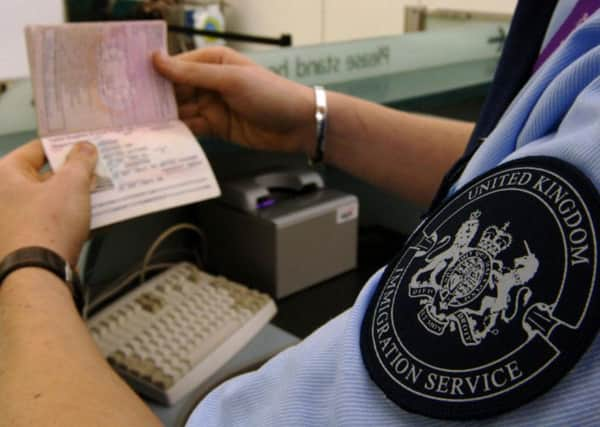Three out of four want immigration cut, says poll


However, fewer people now than in 2011 think immigration is bad for the economy – 47 per cent in 2013 compared with 52 per cent two years previously, new findings from NatCen Social Research’s British Social Attitudes survey found.
The results of the survey, which are to be revealed in a BBC2 documentary The Truth About Immigration tonight at 9:30pm, come nearly a week after access restrictions to the UK labour market were lifted for Romanians and Bulgarians.
Advertisement
Hide AdAdvertisement
Hide AdPenny Young, chief executive at NatCen Social Research, said: “The social attitudes survey shows that public desire for a cut in immigration to the UK had begun to rise even before the restrictions on migrants from Romania or Bulgaria were lifted at the start of the year.
“Moreover, a majority of people who think immigration is good, economically or culturally for the UK, still want to see it cut.
“These findings highlight the complexity of this issue for politicians facing two elections in 18 months and with limited options if they want to attempt to reduce migration from Europe. The public broadly agrees that immigration is too high, but there are stark social divisions over the economic and cultural benefits of immigration.”
The research shows 54 per cent of respondents see immigration as good for the economy while 55 per cent of those who see it is as culturally beneficial also want to see immigration reduced.
In the documentary, former Labour ministers reflect on their decision to open the doors to workers from Eastern Europe in 2004, when Poland and seven other countries joined the EU.
Jack Straw, foreign secretary from 2001 to 2006, said: “The predications were completely catastrophic. I mean, they were wrong by a factor of ten. On immigration, it was bluntly a nightmare and it got more and more difficult.
“We did get it wrong and I deeply regret it. I regret it because it undermines trust in government, if you’re that wrong.”
But David Blunkett, home secretary from 2001 to 2004, told the programme he did not regret the decision. He said: “I’m unapologetic because if you don’t have legal, managed migration and people don’t sign up so they pay national insurance and tax, they’ll work illegally.”
Advertisement
Hide AdAdvertisement
Hide AdTheresa May, Home Secretary, told the programme: “I think the problem in the past has been that there’s been this general assumption that immigration was always good for the economy.
“I don’t think people have looked at it sufficiently closely to be able to recognise the impact it has on members of the public.”
Shadow home secretary Yvette Cooper said: “I think there should have been more debate about immigration, I think we should have had a more calm, measured debate and sensible response to people’s concerns, but also listening to what those concerns were, listening to people who were worried about jobs or wages or worried about the pace of change.”
Ukip leader Nigel Farage told the programme that he believed that fear of being labelled a racist has stifled the debate.
He said: “They tried to rubbish us, they tried to say that anybody that dared to talk about this subject was necessarily a bad person and racist.”